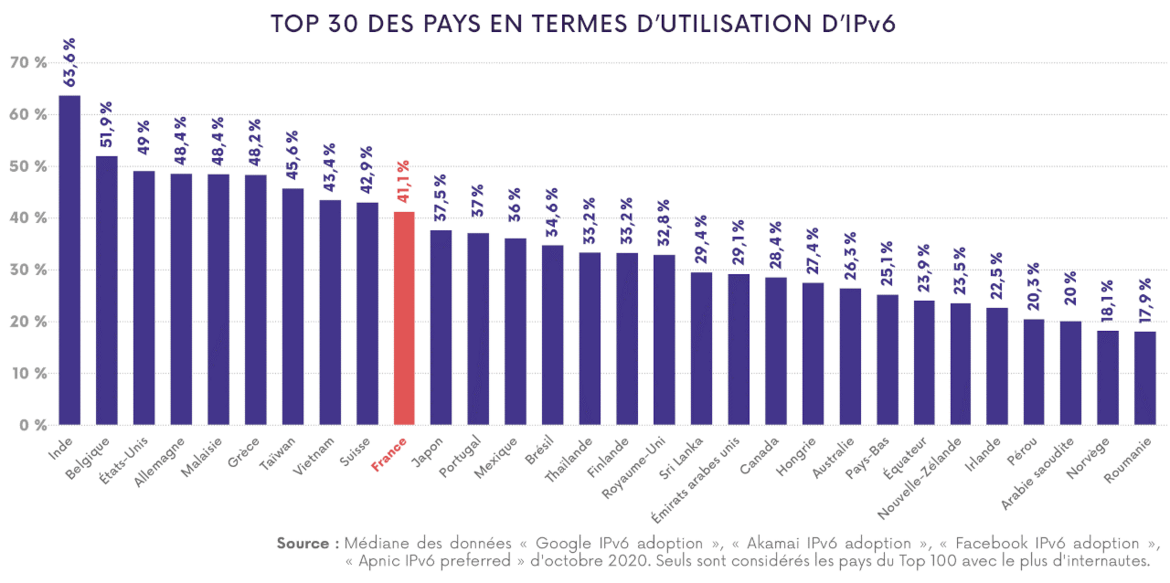On 25 November 2019, the RIPE NCC (the regional registry for IP addresses which is tasked with allocating IPv4 addresses in Europe and the Middle East) announced the exhaustion of IPv4 addresses.
This dearth of IPv4 addresses means that the internet will not stop working but it will stop growing. This shortage is also resulting in a significant increase in the price being charged for these addresses in the secondary market, which creates a real barrier to entry for new entrants to the internet. It has therefore become imperative, for the sake of competition and innovation, that all internet players switch over to IPv6.
Arcep is publishing the 2020 edition of its barometer of the transition to IPv6 online, which reveals significant but still insufficient progress.
The barometer takes a look at all of the players along the internet chain, and the progress they are making in their transition to IPv6. It details the current status of deployments and includes the main operators’ forecasts for both fixed and mobile networks.
The 2020 edition was an opportunity to expand the information gathering process to include the main “business market” operators, to gauge the status of the transition in business products. In addition, because the momentum can be accelerated by having the government lead by example, indicators on how the governments’ different websites and online services are progressing in their transition to IPv6 are also included this year.
Once again this year, Arcep reveals that the majority of players are not planning for a deployment that will enable them to deal with the exhaustion of IPv4 addresses, and urges the entire internet ecosystem to accelerate the pace of their transition – which is the only future-proof solution.
On fixed networks, Arcep has observed progress amongst the main telecom operators in France, but is calling on them to step up their efforts further still. Despite having lagged behind in IPv6 deployment, Arcep notes that forecasts for mobile networks are encouraging, and urges operators to keep up their efforts to hasten the transition.
The lack of progress amongst web hosting companies remains glaring. Only 18% of the three and a half million websites with .fr, .re, .pm, .yt, .tf and .wf domain names are currently IPv6-enabled [1]. And the percentage amongst mail servers is alarming: with only 6% of them being IPv6-ready.
France has advanced in the global rankings, and is now in 10th spot in terms of IPv6 adoption (according to the four main sources of publicly available data: Google, Akamai, Facebook and Apnic) and ranks fifth in Europe.
The IPv6 task force, which Arcep created in partnership with Internet Society France, is publishing its first handbook, “Businesses: why switch to IPv6?”.
Created in November 2019, the IPv6 task force is open to all internet stakeholders (operators, hosting companies, businesses, public sector players, etc.). Its goal is to help accelerate the transition to IPv6 by enabling participants to tackle specific problems and share best practices. The most pressing issue the task force identified was to encourage businesses to make the transition to IPv6. As a result, today it is publishing a handbook that explains to businesses why it is important for them to adopt IPv6. The handbook also contains four testimonials from enterprises that have made or are in the process of making the transition to IPv6.
The task force will continue to work on helping businesses achieve this transition, by producing a how-to guide: “How to deploy IPv6”. If you would like to be part of this work, sign up to the task force.
[1] Afnic data, August 2020

